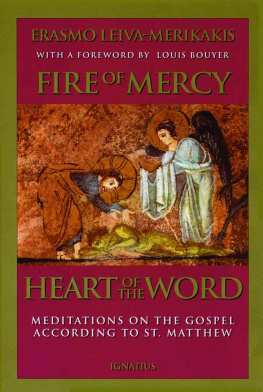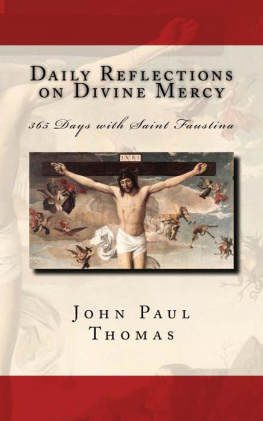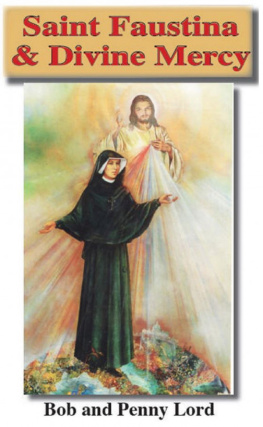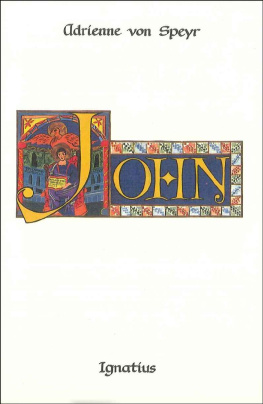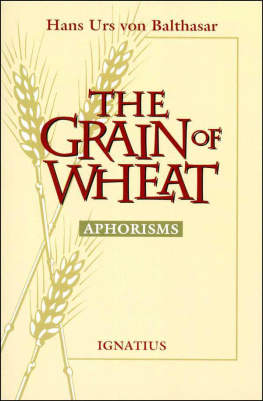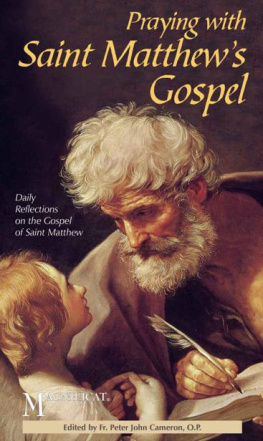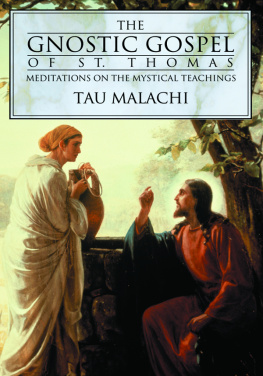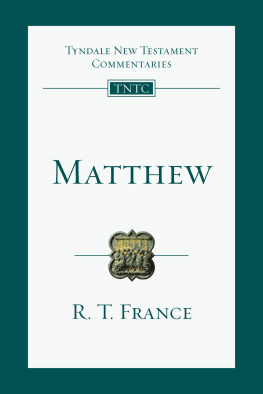FIRE OF MERCY,
HEART OF THE WORD

Christ and Thomas (detail)
ERASMO LEIVA-MERIKAKIS
FIRE OF MERCY,
HEART OF
THE WORD
Meditations on the Gospel
according to Saint Matthew
Foreword by Louis Bouyer
Volume One
( Chapters i-ii )
IGNATIUS PRESS SAN FRANCISCO
Cover by Roxanne Mei Lum
Cover art:
Christ the Good Samaritan
Codex Rossanensis , mid-sixth-century
Kunstverlag Maria Laach
1996 Ignatius Press, San Francisco
All rights reserved
ISBN 978-0-89870-558-4 (PB)
ISBN 978-1-68149-179-0 (EB)
Library of Congress catalogue number 95-75664
Printed in the United States of America
Al dulce amor de
MIREYA
al cario entraable de
CHRISTIANE, ADRIANA y ALEXIS
a mis queridos padres y hermanos
ERASMO y JOANNA, CARLOS y HELENI
y a la venerada memoria
del P. HANS URS VON BALTHASAR
intellectus spiritalis magister
:
Thy words were found and I ate them, and thy words
became to me a joy and the delight of my heart.
Jeremiah 15:16
Qui nous atteindrait sur cette poitrine
dou toute lumire est issue ?
Who could ever harm us resting on this breast from which all of light has come forth?
Georges Bernanos, to his fiance
.
Our God is a consuming fire.
Hebrews 12:29
CONTENTS
II. The Kingdom of Heaven Proclaimed:
Narrative Section
III. The Kingdom of Heaven Proclaimed:
The Evangelical Discourse
IV. Ministry and Mission in Galilee:
Narrative Section: Ten Miracles
V. The Kingdom of Heaven Proclaimed:
Apostolic Discourse
VI. The Mystery of the Kingdom of Heaven:
Opposition from Israel
FOREWORD
W E NOTE WITH SOME DISMAY that what seems to interest contemporary biblical scholars three-fourths of the time is not at all the singular Word of God but rather the many big and little words of all sorts of new scribes and Pharisees. Whereas the Christian biblical scholar has traditionally been urged in his work by an Origens passionate search for the fire of love lurking behind every letter of Scripture, the object of many exegetes passion today seems to be whatever the experts can invent to persuade themselves that the Bible is nothing but a web of childish imaginings, so-called patriarchal prejudices, and other politically incorrect attitudes, all of it, to boot, underpinned by an archaic cosmology and psychology.
It appears we have been needing a layman, both learned and pious (adjectives not necessarily in contradiction), who would at last dare to offer Catholics a true lectio divina , a meditative reading of the divine Word that is at once rigorously critical and deeply moving.
From among the features that distinguish the present commentary by Erasmo Leiva-Merikakis, we are first struck by its continual reference to the original Greek text of Matthew. It would be a serious error to suppose that this search for the many resonances of the original text is something that can interest only the specialized few. The Christian whose desire it is to make direct contact with the Gospel in all its original purity and richness does well to turn to a philologian (a natural lover of words who aspires to becoming a lover of the Word) who can unfold to him firsthand the total physiognomy of the Gospel text in its integral feel and fullness. This is the first thing the book has to offer.
The Gospel, moreover, this text of texts, with its mysterious dynamism, possesses far more than merely linguistic resonances. The best contemporary biblical critics have realized that our Gospels were not written for solitary reading by an individual but rather for the liturgical celebration of a believing community This is why the individual reader needs having the Gospel text restored to the context of praise and Eucharistic Presence where it belongs. By continually seeking the way in which every episode in the Gospel has a sacral, eucharistic orientation, Fire of Mercy, Heart of the Word keeps the Gospel text from losing its original relevance and relief and from being flattened out into a network of messages and propositions, the epidemic habit of moralistic and rationalistic reduction we cannot seem to shake.
Such a liturgical context makes clear the necessity of approaching the Gospel text, not as simple reportage, but as the celebration of the divine Hero. The Gospel, then, presents us not only with an occasion to reflect: it enacts a living encounter, a personal introduction and initiation to a divine and human geste . Naturally, I speak of the event whereby the Son of God permanently enters the story of mankind and by that very fact calls every man to enter and participate in his unique deed of salvation.
Finally, this epic, liturgical, and sacramental reading of the Gospel, in order to find firm rooting, needed to be immersed in the, first Jewish, then Greek, and finally Latin tradition, their unity and interdependence having been prophesied by the languages in which the charge over Jesus head on the Cross was written. The vital historical confluence of these three distinct yet henceforth inseparable religious, linguistic, and cultural traditions palpably manifests what we could call the Gospels lan de conqute , that overwhelming spiritual impulse that made the , the Good News of Christ, the creative deed that fashioned and gave rise to the Catholic Church. The Gospel, as living and acting and transforming Word of Christ, makes the Catholic Church into the universal gathering-up of a saved humanity, reconciled now with the heavenly Father. And, in reconciling us with the Father, the Gospel reconciles us universally with one another in Christ, as St. Paul says.
In the midst of our age of overspecialization, not only in the realm of science but even in the intimate realms of theology, poetry, and Christian living, I can only hope that the efforts of this layman may succeed in inviting many to the banquet of Gods living Word, whose riches are inexhaustible and able to satisfy the longings of every mouth.
Louis Bouyer, Priest of the Oratory
September 21, 1995
Feast of St. Matthew
ACKNOWLEDGMENTS
I NEXPRESSIBLE GRATITUDE goes, first and foremost, to Mireya Letayf, my wife, for her loving insistence that I give her this book, and to our children, Christiane, Adriana, and Alexis, for their patient support, good cheer, and even... occasional interest in the actual text. With gladness I offer it to my family on the occasion of our twenty-seventh wedding anniversary.
Joanna Merikakis, my mother, has always held before me, quite unawares, the living icon of two beatitudes I do not yet possess: thirst for justice and purity of heart. For thus embodying the Gospel and not letting me forget, I owe her infinitely more than physical birth. And my father, Dr. Erasmo Leiva de la Torre, no longer needs this book: it is my hope that, by Gods mercy, he already inhabits the region of light and joy to which my words strive to point.
Throughout the years Fr. Louis Bouyer, of the Oratory, has never ceased to be a looming human presence, a fountain of knowledge and intelligence, a steady friend, and an indispensable inspiration. All by himself he is a monument to the unity, in the Catholic tradition, of intellectual endeavor and childlike faith.
Fr. Joseph Fessio, S.J., has for nearly twenty years been for me and my family an inexhaustible source of encouragement, a challenging intellectual and spiritual companion, and the proponent of endless undertakings in the service of the Church. In a few instances I have actually risen to the occasion! For all of it I thank him, but above all for his loyalty as friend and his charity as brother in Christ.
Next page
